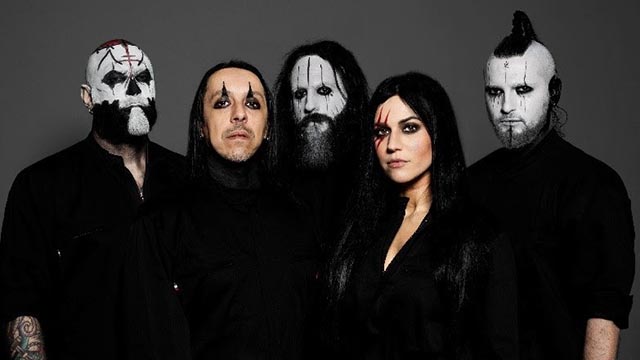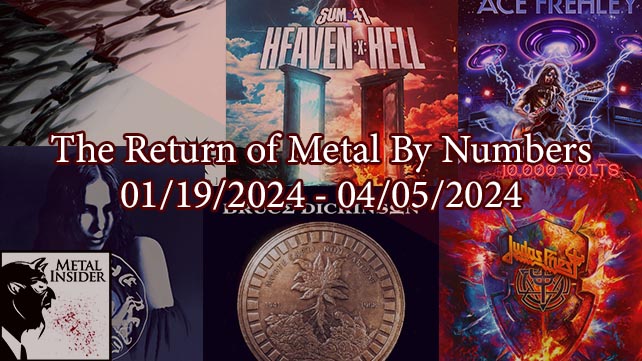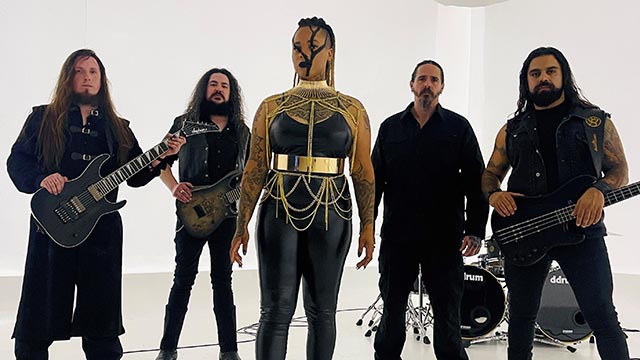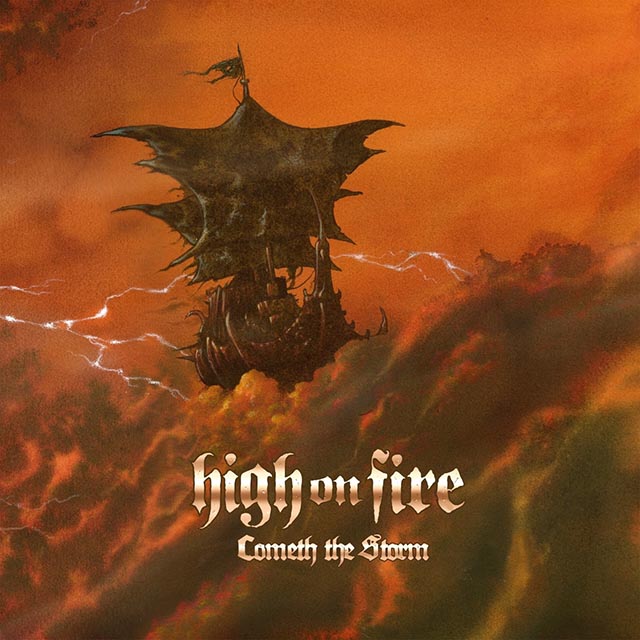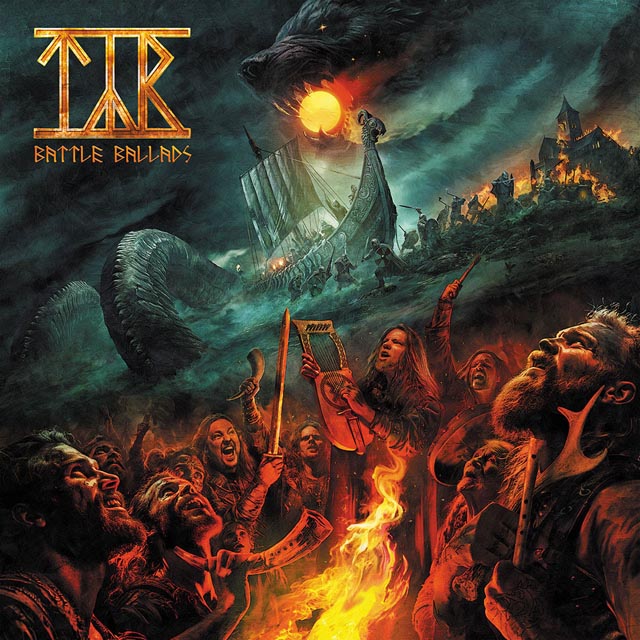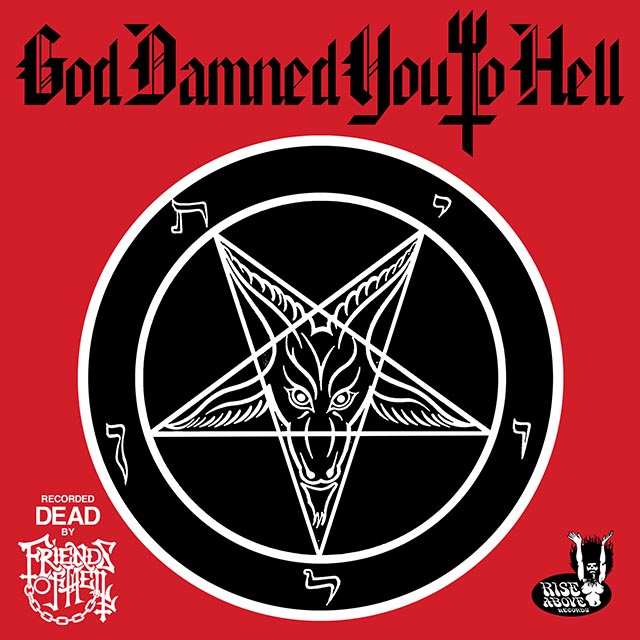Roland Grapow is simultaneously accomplishing a couple different things with the release of his band Masterplan’s new record, PumpKings. First, the former Helloween guitarist, who began his career in the NWOBHM-inspired band Rampage, is celebrating music that he wrote for said German power metal institution during his 12-year tenure with the band, replacing original guitarist Kai Hansen, beginning with 1991’s Pink Bubbles Go Ape, until 2000’s The Dark Ride. Secondly, he’s bringing Masterplan full circle by showcasing the current vitality of the band’s current lineup and their powerful readings of these songs, along with his own ever-burgeoning production skills (Grapow currently produces several Slovak and Czech bands out of his own studio in Slovakia).
“I’m proud of the songs, but these days I’d do certain things a bit different,” Grapow explained of the PumpKings release. “So, it was an easy decision to re-record them with Masterplan now. It took quite a while to come up with the album because I was busy with other productions in my studio and in addition we had just released our Keep Your Dream aLive DVD with Masterplan in the Fall of 2015, so there was no reason to rush things.” The Masterplan-interpreted songs are arguably sonically superior to the originals, with added heaviness and a bit more “attitude,” as Grapow tells. Seemingly, this project, by looking back, is the even-heeled closing of one chapter in Grapow’s career with the promise of what’s to come.
If your Helloween taste begins and ends with the two classic Keeper of the Seven Keys albums, shame on you. Grapow’s years brought fantastic releases like Master of the Rings, and infectious Helloween anthems like “Where The Rain Grows.” If you’re not familiar with Masterplan, shame on you yet again, as you’ve been missing out on some spectacular, melodically fierce Teutonic power metal, much in the Helloween vein, yet cut from Grapow’s own unique musical cloth. Masterplan was formed upon Grapow’s dismissal from Helloween in 2001, along with drummer Uli Kusch, who also got the axe from Helloween that year. The first, self-titled Masterplan album was released in 2003, and featured the vocals of the great Jorne Lande, who would be the frontman on two more Masterplan albums. Children of Bodom keyboardist Janne Wirman also notably contributed keys to the album, which is considered by many Masterplan fans to be the band’s strongest release.
Roland Grapow recently spoke to Metal Insider from his home in Slovakia about the new PumpKings album, and the process behind it. He also gave us a fairly detailed account of life behind the scenes during his time in Helloween – the good, the bad, and the ugly. He also says that after several years of key lineup changes, Masterplan is on firm footing, and looks to release new material in the next year or so, perhaps. Here’s what went down during the conversation.
This new Punp Kings album is really a celebration of your time with Helloween and the work you put into that band. Before we talk about the album, I wanted to ask you about joining Helloween, who were really the fathers of power metal, coming from Rampage, which had more of a New Wave of British Heavy Metal vibe. Was it challenging at all, musically, to adapt to what Helloween was doing?
It was difficult, to be honest, because I was about 28, 29 when they (Helloween) contacted me. I’d had a long break from the Rampage days, and I was searching for what kind of direction I should go. I’d had bands from time to time, and even computer stuff when it first came out – the old Commodore; songwriting on the computer. I even tried writing pop music on the computer to keep it going somehow, because I had the wish to make music. Then, I was contacted by Weiki (Helloween guitarist Michael Weiketh) and he asked me if I’d like to join the band Helloween. I’d heard about the name, and coincidentally, that month, I had a music magazine on my table with Helloween on the cover – I was like “what the fuck?” (laughs) I said, “who’s calling me – which guy on the picture are you?” Then, we talked, and he invited me to his home and played me music he was working on. He knew me pretty well – he was a big fan of Rampage and my style of playing, but we had never talked before. I think he had analyzed that the music of Helloween would be too much for my first time of listening. He played me stuff like “A Tale That Wasn’t Right, “Future World,” and stuff like that – maybe five songs. I said, “This is cool, it’s very different from what I listen to.” I was a big Journey fan, Deep Purple, Rainbow, that stuff. As for heavy metal at that time, I liked Judas Priest, Saxon, and I was a big Scorpions fan – but that was it. I was like, “what is this power metal stuff?” I didn’t find out until a few days later when he gave me all of their earlier stuff. Honestly, I wasn’t a fan of Walls of Jericho album without Kiske singing, because I was a big fan of his singing, that’s why. I like good singers, and Michael Kiske was one of the reasons I joined the band.
A bit later, when we went on tour, I saw the success of the band, especially in America on the first tour, and I saw that people really liked it. So, I was growing into the band – it wasn’t easy, especially the guitar style in the beginning. I was more of the classic 70’s guy, so playing all this staccato, tricky stuff was difficult. I had a couple of conversations with the drummer, Ingo (Schwichtenberg), because I needed to be really tight with the double bass drum, which I learned. In the end, I was really happy with it, but it was really challenging.
The Pump Kings album celebrates songs that you composed for Helloween. How did you approach the band with material that you’d written back then? Were the guys overall accepting of it, did they try to change it in any way?
To be honest, I wrote everything that I wanted, and they seemed to like it. The first song that I wrote was “The Chance,” and I played it to Weiki first, and of course, he asked me to make the chorus a bit more melodic, because I’d had all the same melody. I needed some advice, but then I learned quickly what they wanted. The second song was “Mankind,” and that’s when I realized Ingo was finally accepting me as a guitar player. It took two or three years when I wrote these songs, for him to like me as a guitar player, because he’d missed Kai (Hansen, founding Helloween guitarist) so much. There was only once or twice when I presented them with something that they didn’t like – I think it was a session for Better Than Raw, and the reason I don’t have a song on there is because the one I wrote was too Yngwie sounding (laughs). I said, “fuck it, ok; I won’t have a song on the album.” It wasn’t a nice feeling, but I agreed with them.
When you asked about the arrangements with the band members – there wasn’t much. Everything I arranged was all my own. They just seemed to like it. I always tried to impress my band members – if they liked it then I hoped the fans would like it.
I love your era with the band because that’s when I was introduced to Helloween. That era also began some great debate with the fans, especially when Andi came in on vocals after Kiske. There were also the criticisms with the Pink Bubbles Go Ape album and especially Chameleon – that one’s been cited as one that people either loved or hated.
That was part of the difficult starting time when I joined the band. I was the new guy, replacing someone who was very successful within the band – I had the feeling Kai was, next to the singer, the main guy. Everybody liked him, and I even thought Weiki wrote better songs with him – “Eagle Fly Free,” “Keeper of the Seven Keys Pt. 2,” and of course, everyone wanted to hear “Future World” and “I Want Out” – just two songs (laughs). Those first two albums were difficult, because I came into a band that was totally broken – they were fighting each other over songwriting, over the direction of the music, and even as the oldest guy joining the band I was the least experienced. I was shy – I wasn’t joining any discussion there, I was just listening and getting frustrated after a while, trying to get through it. I did get through it with the help of the management we had at that time, like Sanctuary, and also with the producers, like Chris Tsangarides – who I actually had contact with again. I met him three weeks ago and we’re going to produce an album together for a Czech band, which is a different story. But, he remembers everything. I try not to remember too much, but he remembers (laughs). He said that for him, it was a nightmare. He said that the only guy who wrote metal songs for Pink Bubbles was me! We’d already had ballads written for that album – the kind we’d do on Chameleon. Nothing was so strong like the Keeper songs.
So, we toured, and instead of making it better with the next album, we made it worse with Chameleon. I’m just talking about the business, I’m not talking about the songs – I’m very proud of these songs as well. The situation in the band was difficult. I think we went too far with Chameleon, but nowadays people come up to me who are older now, and say how much they like the album now. It’s not typical Helloween or metal, but it’s a good bit of quality music – it’s something different. For me as a fan, as well, I always liked the stuff my idols did. The band Grand Funk Railroad – that’s a band I grew up with and one of my favorite bands. There was a time during their history when maybe they weren’t so heavy-sounding anymore, and they had this raspy, bluesy feel. They did every album different, and number one hits with this cheesy stuff like “Locomotion,” and I was so proud of it. I said, “Oh my god, my favorite band is number one in America!” I was so proud of it as a normal fan, but of course nowadays I’d probably hate them or something (laughs). So, people were reacting totally differently back in the 70’s. I loved everything Grand Funk did.
But, the problem with those first two albums, was also life. After Chameleon, we did the tour, and I saw many, many question marks on the faces of the fans. I said to Weiki, ”I don’t think they’re happy about what we did here” (laughs). That was difficult. That’s why we changed the singer and Andi Deris came in, of course.
I’ve read that your favorite Helloween album during your tenure was The Dark Ride. I wanted to ask you about working with Roy Z on that album, as I’m a huge fan of the work Roy did on Bruce Dickinson’s solo albums.
It’s like when you’re a young musician and you don’t know what’s going on – you work with different producers. Like in the beginning with Rampage, they weren’t offering much advice; it was doing everything on your own, there are little ego things happening on the inside. You do everything possible yourself you make sure it’s good when you’re recording it – a dry sound. I think a lot of the Rampage stuff really didn’t sound that good – very trebly, and not very well recorded. With the second Rampage album, it was totally different – it sounded great with some great solos and was a very different experience. There wasn’t really much talk with the engineer or producer – it was “go do what you want.” Roy was the first guy – even Tommy Hansen (Helloween producer ’87-98) didn’t say anything to me, as he was always working with Weiki and I worked with the engineer and the other studio guys.
When Roy came in, he was younger than me, but he was like the experienced older brother who shows you how to do it. I was like, “What the fuck, man!” everything he showed me, I liked. It was stuff I didn’t know about, like the downtuning for heavy guitars and inspiration for this modern guitar sound. I was a classic Marshall guy, and he showed me this rectifier amplifier – “Oh my god, it sounds good!” (laughs) Then, we had a discussion before we went into the studio, that the band hated my solo albums, and I was too much like Yngwie Malmsteen. Weiki said, “Can you be more the old days, like in Rampage – more melodic?” You know, Michael Schenker, Uli Jon Roth – my old idols. So, we went back in and I tried to make them happy – I still wanted to be a part of the Helloween family. I changed totally on this session, and Roy was helping – he was pushing me in a good way. We had some really bad moments with the band members together there, but Roy was a guy who was always there for me. He changed me back to the original Roland Grapow, and a step further. I think The Dark Ride was part of the first Masterplan album, to be honest. I wanted to continue with what I’d learned there, and I’m still doing it now as my own producer.
How did the Masterplan guys react to taking on older Helloween material?
When I talked about the idea, there was not so much input from the band members – especially our keyboard player (Axel Mackenrot) and Rick (Altzi, vocalist). Rick knew that when he sings songs from Michael Kiske and Andi Deris, everyone would compare him. I had the idea that maybe he can sing all the Andi Deris songs, which I think he’s really brilliant doing. Then I thought we’d rehearse a little bit, a few years before we did this album. We did rehearse a lot – I went back to the technique I had on my first solo album, like a Geoff Tate type of singing. But, we were always surrounded by wives or girlfriends who said, “I don’t like when you sing so high (laughs). You’re a man, you should sing like a man!” But, so many fans, they love this type of voice only – I know these people, and they’re only supporting Michael Kiske. They don’t even like Deris, or our singer – they aren’t even impressed by Jorne (Lande), our former singer, who I think is one of the best singers I ever worked with. These people only like that clean-sounding, high voice, 80’s metal thing that they grew up with. I tried to sing like that, but I realized I put myself under so much pressure, and I thought people would hate it anyway. So, I left the pressure to Rick! (laughs) I only sing on one bonus track, and I think I did ok. I’m not one hundred percent happy because when I was singing it, I was always thinking about Michael. I thought, “Ok, I’m not doing it better anyway, and I tried to copy him, which is also not right. What I learned in the three years of rehearsing is that the direction was ok, but I should sing something new – not related to former songs. So, what this is, is Rick singing everything like Masterplan songs.
So, as far as Masterplan goes right now, I assume things are well and the lineup is stable?
From the band situation, it’s brilliant, to be honest. WE have everything in place for what…four years. We changed the drummer again – we have Kevin Kott as the new drummer, but basically, we’re still friends with Martin Sharoupka (drums, 2012-2016). Martin’s just too busy with Cradle of Filth, and Cradle of Filth is much more successful – more touring. We had problems with scheduling festivals and other dates, so Kevin came into the boat, and he’s so easy to work with. We have fun together, and we can play smaller shows – he doesn’t care. That’s what we need – people that can play without any big discussions. We just go – I take one of my guitars in a travel case to the plane and that’s it. Now’s not a time to be taking trucks or anything, with payments so high, to be honest, and we have to deal with what is there. We don’t even take crew members – we use the guys at the festival. You need flexible people in the band for that, and that’s what we have. It’s amazing.
Is there a definitive Masterplan album for you, Roland? A lot of fans will say the debut album is the one, but you’ve got five albums of original material. What are your thoughts on that?
I’m just no talking to the press that I’m working on the next studio album. You need to always have hope, and I still believe, maybe not a copy of the first album or Aeronautics, but I think we should go half – build on the Masterplan style, and there’s always a bit of Helloween element in there, because that’s where I came from. Masterplan’s always taken it a step further, though. There is something more powerful, more melodies as well – I call it “more cooler” music. I’m a big fan of bands like Ozzy Osbourne’s with Zakk Wylde and his guitar playing, and I love John Sykes – that’s kind of what I try to be in Masterplan. To be honest, a mix between the first and second albums would be perfect. I think what we did there is something magic, and that’s not easy to get anymore. Jorne was a part of it, Uli (Kusch, ex-Helloween drummer) was a part of it, but now I have different team players and I have to deal differently.
My interest is bigger than most, because I was one of the main motors behind the first album, because I produced the band, financially, as well. When we started this, we didn’t even have a record deal, but I believed in it – the song material that Uli and I had was so strong, that I said I would take the risk with the rest of the money I still had from Helloween, and I invested it in the band. We needed to have the right singer, and we were happy to find Jorne at that time. I also needed to produce, because that’s what I learned from Roy Z. I wanted to get our visions coming through in the right way and teaching us, and with Andy Sneap as well (first Masterplan album producer). Now, Andy’s on of my best friends – we meet every two years in his studio. I’m always visiting him about production stuff. I still hope we make a new album that’s incredible in a different way, because I was never into copying myself. I never want to write “The Chance #2” or “Time of the Oath #2.” Also, I’m always searching for something that makes my excited, and I hope that people will get the same feeling.
It seems like right now, metal as a whole is very strong worldwide – and creatively vital as well. Do you get a chance to listen to newer bands that are doing well like Sabaton or Ghost?
Not so much, to be honest. I know they’re really, really huge. Sabaton is one example of I don’t’ understand why they’re so successful – I know the concept is war-type of lyrics and shouting. I’m more of a melodic guy – I like nice melodies in the vocals or bluesy stuff. But, I’m listening to modern bands like Amon Amarth, and I’m still a big fan of Rammstein, which is totally different. Basically, I’m a producing guy, so everything that Andy Sneap is mixing, I’m checking out. I’m also working a lot with thrash metal bands from Czech Republic and Slovakia – which I like as well. I’m liking this music – it’s energy. My dream is always to make a great guitar song, I don’t care what style of music it is. You know, if you told me the headliners at Wacken, I probably couldn’t tell you what they do. I’m a guy who is looking forward to upcoming new Saxon music – I also can’t wait to check out the newest Judas Priest and see what that will be like.


